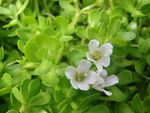Shift with the season by following this time-honored wisdom.
One of my favorite aspects of Ayurveda (and one that I teach as THE WELL's Director of Ayurveda) is that health is actually our natural state — and it can be accessed by following the rhythms of nature. The guiding Ayurvedic seasonal health teachings are called Ritucharya, which comes from the root Sanskrit terms “ritu,” meaning season, and “charya,” meaning to follow.
In this ancient modality there are three bio-forces called doshas, comprised of the five great elements: ether, air, fire, water and earth. Doshas are naturally increased at different times of the year, and in the spring, when the flowers are blossoming, the birds are chirping and everything is dewy, kapha dosha (made up of water and earth elements) is dominant in the atmosphere.
That moisture is mirrored in our inner environment and can lead to common spring ailments such as colds, coughing, allergies, asthma and more. Below, I share how to avoid those issues and activate health by living the Ayurveda way.
1 Eat light foods
The earth and water elements the reign in spring are heavy as compared with the more ephemeral nature of fire, air and ether. To counteract that and balance our systems, it's best to eat light foods.
What that means: Heavy foods tax your digestive system, making you feel sluggish and that seem to sit in your stomach — meats, cheeses, pastries, oils, pies, milk, butter, nuts and many fruits. Foods that are light and easier to digest include green vegetables (like asparagus, spinach, collard greens, dandelion greens, chard and kale), peppers, carrots, cabbage, cauliflower, eggplant and green mung dal.
2 Increase cardio workouts
We're all aware of the importance of exercise for good health, but in Ayurveda, the recommended quantity and type of exercise depends on the season.
Ancient Ayurvedic texts advise to get plenty of aerobic movement in spring. The thinking: Exercise increases natural heat in the body, which allows you to digest food better. Digestion is compared to a fire in Ayurveda, and we want to keep our inner digestive fire strong to be healthy. (Find seven more Ayurvedic secrets for better digestion here.)

1 Add heating spices to your meals
Personally, I experience a lot of heat in my body, which can manifest in redness in the skin (think rashes, acne, blemishes or hives) or symptoms such as bloodshot eyes, hot flashes or excessive sweating. So for most of the year, I avoid using a lot of spices like black pepper, garlic and ginger. Come spring, I get to kick my consumption up a notch.
Cooking with ginger, mustard seeds, fenugreek seeds, ajwain seeds and black pepper (which I collectively call “the fiery fivesome”) is a great way to boost your health and prevent respiratory challenges and spring allergies. These spices are amazing in savory dishes, such as curries, stir fries, soups, pasta or kitchari, a comforting veggie-filled dish. (Try this delicious recipe for kitchari from THE WELL Kitchen & Table.)
You can also use a delicious savory spice blend called garam masala, which includes four of the five fiery spices. Banyan Botanicals is a great online source for many Ayurvedic spices, and you can order ajwain seeds from Mountain Rose Herbs, Amazon or Walmart.
Finally, ginger doesn't just taste good — it has well-documented medicinal powers. In addition to adding it to meals, any time I feel a cold coming on I find it helps to apply a paste made of dry ginger powder and water on my nose and under my eyes for as long as it’s comfortable.
2 Snack on spoonfuls of aged honey
For optimal digestion, Ayurveda generally recommends avoiding snacking since it's best to wait until your previously consumed food has been fully digested before eating more. There are, however, a few exceptions, such as "snacking" on honey during the spring!
When enjoyed by itself on a regular basis, honey (ideally aged for at least one year) has unique immunity-boosting qualities. Research from the National Institutes of Health shows that it can benefit a range of conditions, including diabetes, asthma, inflammation, cough, fever and more. It's also full of antioxidants, which help your body ward off disease. Enjoy up to four teaspoons per day.




